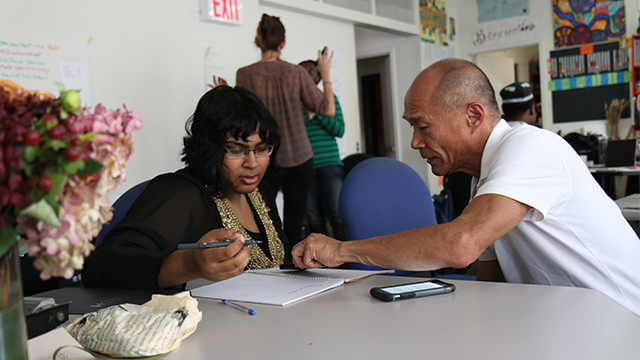10 Tips for Being a Positive Role Model in Your Theatre Community
Written by Ashleigh Gardner
January 14, 2019
When we’re young, budding theatre majors, we’re always looking for an older, more experienced theatre professional to show us the ropes. They teach us new ways of tackling challenges and encourage us to pursue our dreams while making our community a better place. But what happens when we’re the ones who are older? How can we be the role models we once admired? If you’re a young adult looking for ways to make a positive difference in your theatre community through mentorship, take a look at the tips below!
1. Stray away from gossiping about other artists.

In an industry where people often compete for notoriety, fame, and attention, it’s easy to get caught up in gossip. Do yourself (and your protegé) a favor, and stay away from malicious gossip. Gossiping about other artists shows those young people who look up to you that social side-talk is more important than the project and art at hand. (It also gives the younger artist permission to continue the cycle of gossip in the community.) Help make gossip a taboo topic. Encourage artists to work on bettering their own projects instead of focusing on who messed up in an audition. Remember: community over competition.
2. Stop and think before working with artists who have poor reputations in the community.

Sometimes, other artists in the community have poor reputations for the way they misuse their authority: not paying artists, verbally abusing them, coercing artists into unprofessional relationships, spreading malicious rumors, or even being dishonest to get ahead. If you, as the mentor, know these things to be true, reconsider working with people who have a poor reputation. Instead, show your protegé that you respect professionalism in theatre by working with theatre artists who are positive community members that pay artists, speak respectfully to them, maintain a professional distance, converse honestly, and act truthfully. This shows younger actors, directors, technicians, and writers that ethics matters just as much as talent.
3. See your own projects through.

It’s often very difficult to see a huge project through, but it’s important that every project, no matter how large or small, is completed. Completing your own projects is a great way to show younger generations that belief in a project is half the battle.
4. Make time to spend with them.

There’s nothing more frustrating than a mentor who doesn’t have time for their mentee. If you’re committed to taking on the responsibility of teaching a younger artist, then make time for them. Set a time every week or every other week for a lunch or coffee outing. This gives the mentee time to prepare some questions or topics of discussion, and it gives you the ability to transfer some sage wisdom to an artist who may need it.
5. Give positive advice (even if it means admitting your shortcomings).

There are so many topics that are included in this section, from advising your protegé to choose colorblind casting to never being afraid to take a break from projects. If your mentee asks you for advice on how they should handle a certain situation, then use your past personal experience to inform what you tell them. However, be honest with them. If you made a mistake or several mistakes, admit it, and then move forward and share how your mentee could do a better job than you did. Advice isn’t just limited to personal experience either! If you’ve read a great book on directing, then recommend it. If you’ve heard about a really effective workshop training, then recommend that, too. The whole purpose of mentoring is helping the younger generation do a better job than we did in the past.
6. Provide encouragement while delivering realistic expectations.

Young artists often get discouraged when they encounter obstacles that they have repeatedly encountered or obstacles that are brand new (and also scary). This is the perfect time for a mentor to step in and provide some encouragement (while also accepting that things are still very difficult). A great way to give positive reinforcement is to acknowledge the difficulty the mentee is experiencing, then letting them know how their various strengths can help the project move forward. If you can, help them find a new perspective on the experience.
7. Don’t do the work for them.

If a mentor does all the work for their mentee, the younger person learns nothing — only that work will be done for them. Doing all the work for someone else robs them of the value of personal experience. Instead, stand to the side and be available to give advice (when solicited) and encouragement.
8. Remind them that reviews aren’t everything.

When a show is reviewed, sometimes the reviews aren’t all that stellar. In cases like this, remind the artist that a review doesn’t define their future. It’s just an opinion of one person. Conversely, if a review is really positive, remind your mentee not to let the positive feedback go to their head. Let them know that humility is always the best response to take in any situation in which their art is praised — and criticized.
9. Stand up for them and squish the hater-talk.

If you find yourself in a conversation where your mentee’s project or efforts are being insulted, step up, be the bigger person, and squish that negative talk. There’s nothing more heroic than a person standing up for another person’s honor, efforts, and reputation. This can be really difficult if you are closely acquainted with those Negative Nancy’s doing the gossiping, but if your mentee catches wind of your valiant efforts to defend their project, they’ll feel secure knowing that they can trust you with their own personal artistic journey. It also sets an example to the gossipers that ethics are more important than casual trash talk.
10. Keep things professional.

Bringing this back around to #2, always keep your mentorship relationship professional. This means creating a safe and respectful social and physical distance between yourself and your younger mentee. Set boundaries for yourself, and respect the boundaries that your mentee has also established. Power and influence can sometimes turn sour — don’t let it. Take charge of creating a safe space for yourself and your protegé by keeping things professional at all times.
Need some advice? We’ve got you covered.
- 5 Ways to Say “Thank You” to Your Cast and Crew
- 5 Character Development Techniques to Use in Rehearsals
- 5 Small Ways to Get Into (And Embrace) Your Character
- 5 Ways to Take Care of Yourself During Tech Week
- Devising Theatre: 7 Quick Tips for Your First Devising Project
- “I Can’t, I Have Rehearsal”: 5 Tips for Scheduling Your Life When You’re In Theatre
- How to Make Rehearsals A Warm and Welcoming Environment
- 10 Basic Rules of Stage Combat (That Keep Everyone Safe)
- 5 Advantages of Learning Stage Combat
- Theatre Artists on a Budget: How to Be Smart and Healthy While Pinching Pennies
- Productions on a Budget: Finding Props/Costumes/Set Dressings/Set Pieces Without Breaking the Bank
- 6 Steps to Memorizing Shakespeare
- 5 Helpful Tips for Attending Callbacks
- 10 Tricks to Staying Healthy All Season Long
- How to Balance Theatre and Coursework
- 10 Items Every Actor Should Carry in Their Rehearsal Bag
- 10 Items Every Dancer Should Keep in Their Rehearsal Bag
- Discover the Delightfully Nerdy World of Dramaturgy
